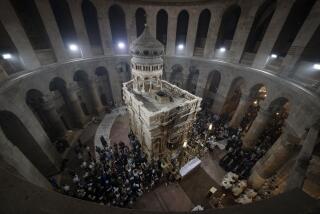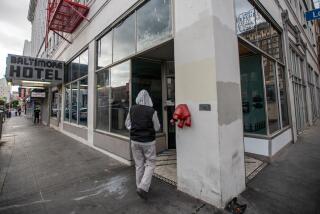Israel Helped Buy Greek Church Building Lease : Old City: The admission turns a Jerusalem land dispute into a question of government policy.
- Share via
JERUSALEM — After denying any involvement for more than a week, the Israeli government admitted Sunday that it put up $1.8 million toward the controversial purchase of the lease on a Greek Orthodox Church building in Jerusalem’s Old City.
In a stroke, a battle that seemed to be narrowing into a private land dispute between religious groups has turned into a question of government policy with possible implications for U.S.-Israeli relations.
Government officials said the Housing Ministry gave the money to a company called Himnutta, a branch of the Jewish National Fund, to help buy the lease. Himnutta makes sensitive land purchases, notably in the occupied West Bank and Gaza Strip, on behalf of the fund.
On April 11, 150 members of a rabbinical seminary moved into the large building, which is called the Hospice of St. John. The nationalist Jewish group had said that it purchased a long-term lease with private money.
The takeover ignited protests by Muslim and Christian residents of the Old City who viewed the takeover as a step toward an eventual ouster of Muslim, Christian and Armenian residents from the historic enclave.
Greek Orthodox Church officials said the building’s lease was sold out from under them by a tenant they had been trying to evict for eight years. The church is suing to evict the new residents as well.
At first, the government denied involvement in the purchase. It was handled through a company registered in Panama. After weekend reports that the Housing Ministry put up money, a ministry spokesman admitted that the government had provided 40% of the total $4.5 million price. The rest of the money came from unspecified donors.
“The purchase of foreign properties in Israel, and especially in Jerusalem, including church properties, has been performed for many years by government, public and private bodies,” the spokesman said, reading a prepared statement.
The lease purchase was “done according to the will of the buyer and the will of the seller,” the spokesman maintained.
In early April, the government set aside $4 million for other Old City purchases, the spokesman said. Newspaper reports put that sum as high as $7.5 million.
Caretaker Prime Minister Yitzhak Shamir knew nothing about the money for the hospice lease purchase, according to his spokesman, Avi Pazner. The prime minister will not comment further on the case because it is in court, Pazner added. On Thursday, Israel’s Supreme Court is expected to rule on appeals of eviction orders against the Jewish residents.
The national government’s involvement drew fire from the office of Jerusalem Mayor Teddy Kollek, who has criticized the takeover of the building as an affront to religious and ethnic feelings in the city. “The actions of government agencies that strain the delicate fabric of relations in Jerusalem are to be deeply regretted,” Bonnie Boxer, the mayor’s spokeswoman, said.
Israel displaced Jordanian rule in eastern Jerusalem, the West Bank and Gaza Strip after the 1967 Middle East War. The West Bank and Gaza remained under military occupation, but Israel formally annexed the eastern sector of Jerusalem, placing the entire city under Israeli sovereignty.
The United States and many other countries refused to recognize the annexation, and Washington says the final status of the city should be worked out in peace talks. Since 1982, the U.S. government has opposed unilateral moves that would change the “character” of annexed parts of the city.
The U.S. urging for restraint has usually been applied to new construction in outlying areas of annexed East Jerusalem. It is not clear how the White House will view the Israeli effort to change the makeup of the Christian Quarter or any other sector of the Old City.
Last month, President Bush expressed opposition to what he termed Israeli settlement of eastern Jerusalem. His comment drew an angry response from Shamir who asserted the right of Jews to live anywhere in the city.
Shamir heads a caretaker government that remains in power while Israel tries to sort out a tangled political crisis. Shamir’s government, led by the rightist Likud Party, fell in a no-confidence vote five weeks ago, but Shimon Peres, his chief rival and head of the center-left Labor party, has been unable to forge a new ruling coalition.
In the meantime, Shamir has been moving speedily ahead on settlement projects in the West Bank and Gaza. On Sunday, the government announced preparations to build housing in Nablus and Hebron in the West Bank. A settlement is planned for Allon, on the West Bank near Jerusalem, as well as one in the Gaza Strip, government officials added.
Washington, which is trying to promote Israeli-Palestinian peace talks, opposes new settlements.
More to Read
Sign up for Essential California
The most important California stories and recommendations in your inbox every morning.
You may occasionally receive promotional content from the Los Angeles Times.













